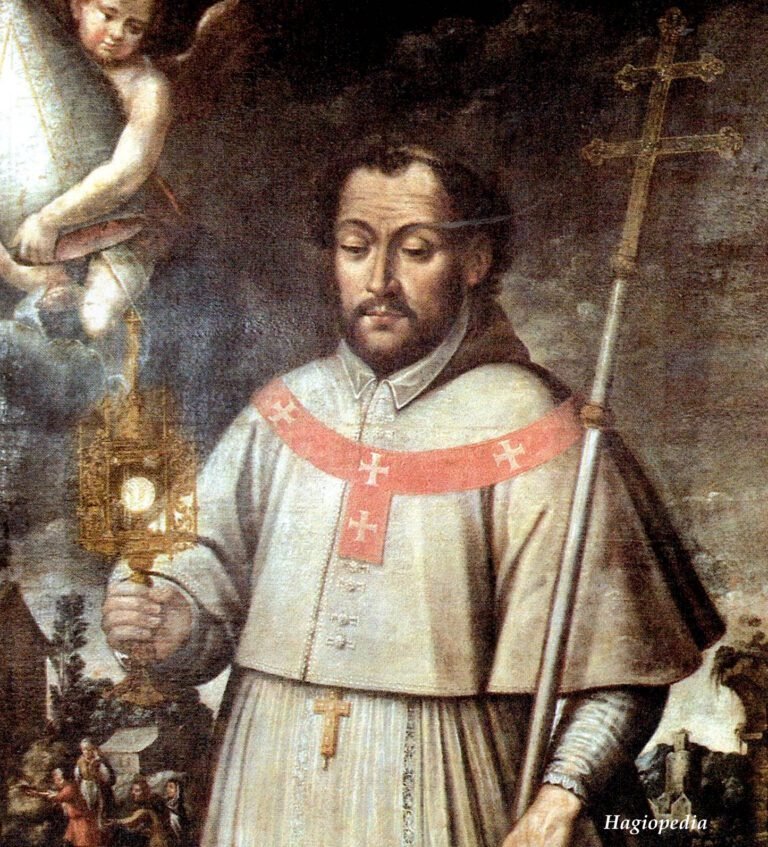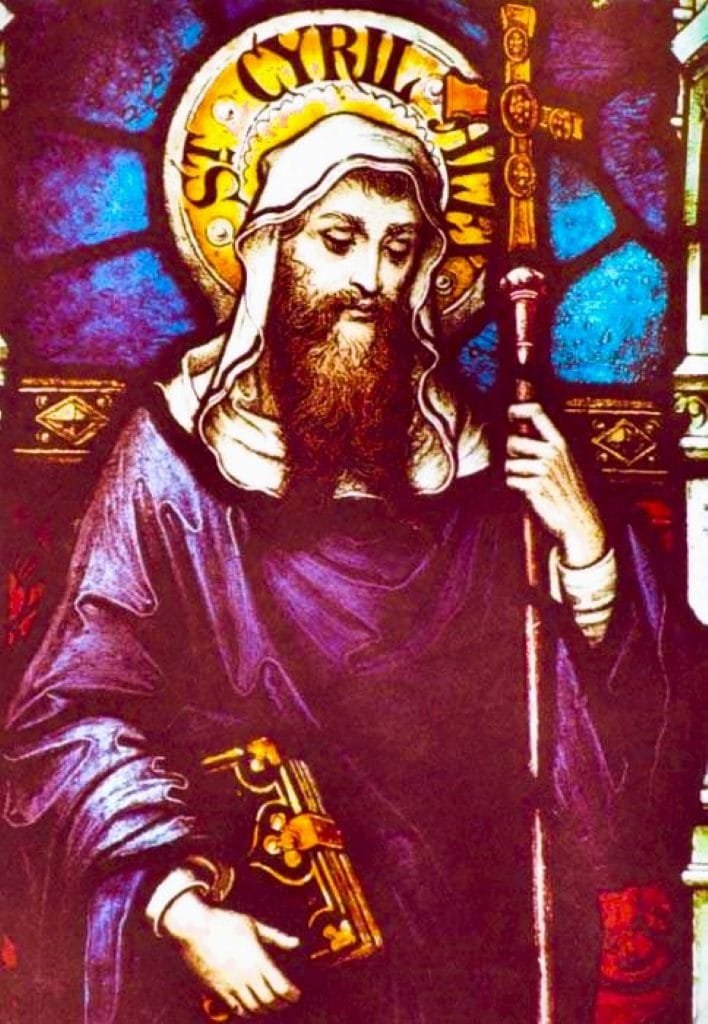June 1: SAINT JUSTIN, Philosopher and Martyr (c. 100-165).
Short bio, martyrdom account and Pope Benedict XVI’ address on the saint.
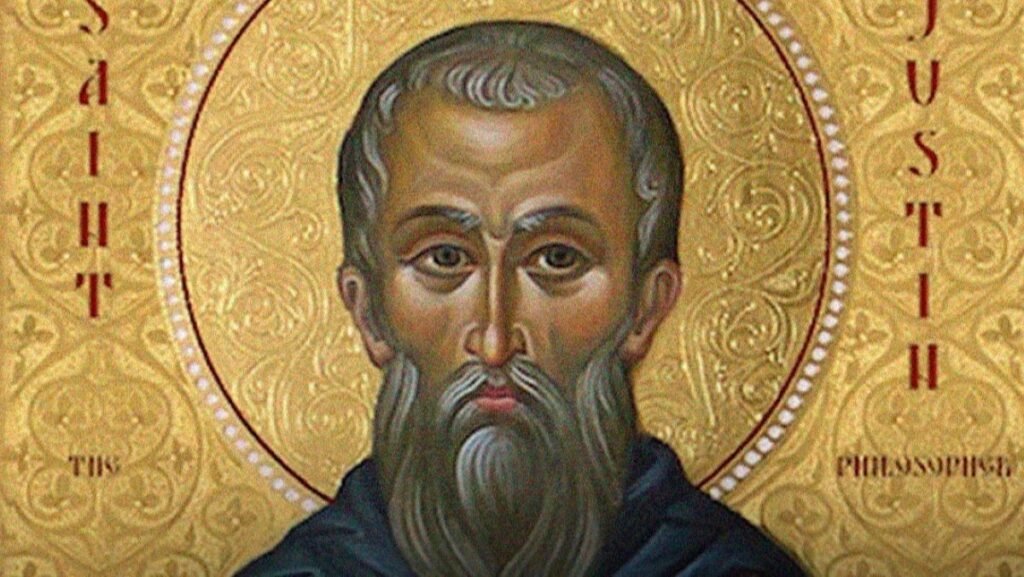
Saint Justin was a philosopher born in Samaria. A convert to Christianity, he was a passionate searcher for truth which he found in Christ. He then defended Christian faith with his writings, notably the Apologies and Dialogue. He was martyred (d.165) in Rome during the reign of Marcus Aurelius.
I have accepted the true doctrines of the Christians
From the Acts of the martyrdom of Saint Justin and his companion saints
The saints were seized and brought before the prefect of Rome, whose name was Rusticus. As they stood before the judgement seat, Rusticus the prefect said to Justin: “Above all, have faith in the gods and obey the emperors.” Justin said: “We cannot be accused or condemned for obeying the commands of our Saviour, Jesus Christ.”
Rusticus said: “What system of teaching do you profess?” Justin said: “I have tried to learn about every system, but I have accepted the true doctrines of the Christians, though these are not approved by those who are held fast by error.”
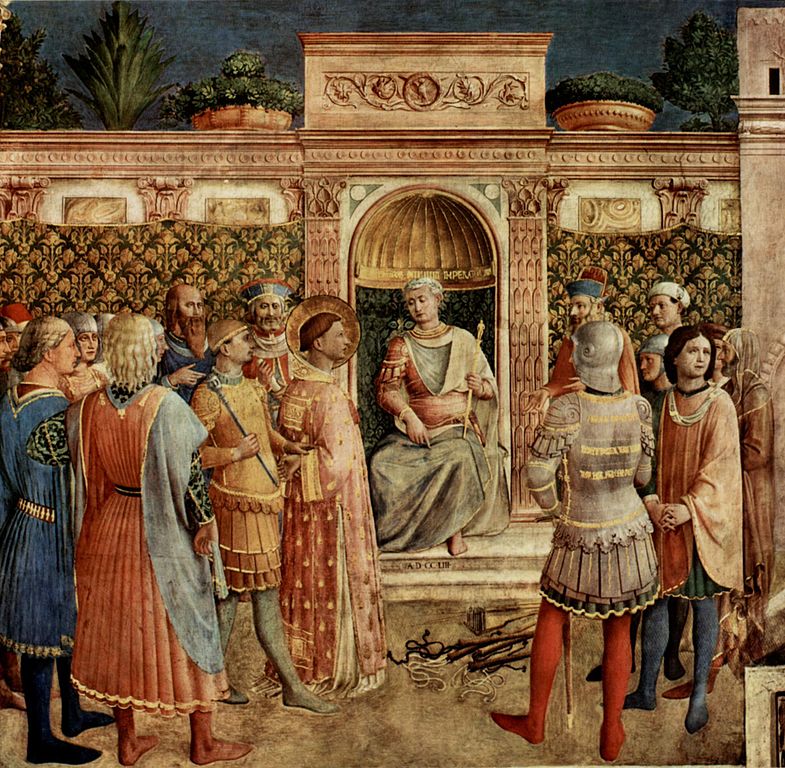
The prefect Rusticus said: “Are those doctrines approved by you, wretch that you are?” Justin said: “Yes, for I follow them with their correct teaching.” The prefect Rusticus said: “What sort of teaching is that?” Justin said: “Worship the God of the Christians. We hold him to be from the beginning the one creator and maker of the whole creation, of things seen and things unseen. We worship also the Lord Jesus Christ, the Son of God. He was foretold by the prophets as the future herald of salvation for the human race and the teacher of distinguished disciples. For myself, since I am a human being, I consider that what I say is insignificant in comparison with his infinite godhead. I acknowledge the existence of a prophetic power, for the one I have just spoken of as the Son of God was the subject of prophecy. I know that the prophets were inspired from above when they spoke of his coming among men.”
Rusticus said: “You are a Christian, then?” Justin said: “Yes, I am a Christian.”
The prefect said to Justin: “You are called a learned man and think that you know what is true teaching. Listen: if you were scourged and beheaded, are you convinced that you would go up to heaven?” Justin said: “I hope that I shall enter God’s house if I suffer that way. For I know that God’s favour is stored up until the end of the whole world for all who have lived good lives.”
The prefect Rusticus said: “Do you have an idea that you will go up to heaven to receive some suitable rewards?” Justin said: “It is not an idea that I have; it is something I know well and hold to be most certain.” The prefect Rusticus said: “Now let us come to the point at issue, which is necessary and urgent. Gather round then and with one accord offer sacrifice to the gods.” Justin said: “No one who is right thinking stoops from true worship to false worship.”
The prefect Rusticus said: “If you do not do as you are commanded you will be tortured without mercy.” Justin said: “We hope to suffer torment for the sake of our Lord Jesus Christ, and so be saved. For this will bring us salvation and confidence as we stand before the more terrible and universal judgement-seat of our Lord and Saviour.” In the same way the other martyrs also said: “Do what you will. We are Christians; we do not offer sacrifice to idols.”
The prefect Rusticus pronounced sentence, saying: “Let those who have refused to sacrifice to the gods and to obey the command of the emperor be scourged and led away to suffer capital punishment according to the ruling of the laws.” Glorifying God, the holy martyrs went out to the accustomed place. They were beheaded, and so fulfilled their witness of martyrdom in confessing their faith in their Saviour.
COLLECT
O God, who through the folly of the Cross wondrously taught Saint Justin the Martyr the surpassing knowledge of Jesus Christ, grant us, through his intercession, that, having rejected deception and error, we may become steadfast in the faith. Through our Lord.
Pope Benedict XVI Catechesis.
In these Catecheses, we are reflecting on the great figures of the early Church. Today, we will talk about Saint Justin, Philosopher and Martyr, the most important of the second-century apologist Fathers.
The word “apologist” designates those ancient Christian writers who set out to defend the new religion from the weighty accusations of both pagans and Jews, and to spread the Christian doctrine in terms suited to the culture of their time.
Thus, the apologists had a twofold concern: that most properly called “apologetic”, to defend the newborn Christianity (apologhía in Greek means, precisely, “defence”), and the pro-positive, “missionary” concern, to explain the content of the faith in a language and on a wavelength comprehensible to their contemporaries.
Justin was born in about the year 100 near ancient Shechem, Samaria, in the Holy Land; he spent a long time seeking the truth, moving through the various schools of the Greek philosophical tradition.
Finally, as he himself recounts in the first chapters of his Dialogue with Tryphon, a mysterious figure, an old man he met on the seashore, initially leads him into a crisis by showing him that it is impossible for the human being to satisfy his aspiration to the divine solely with his own forces. He then pointed out to him the ancient prophets as the people to turn to in order to find the way to God and “true philosophy”.
In taking his leave, the old man urged him to pray that the gates of light would be opened to him. The story foretells the crucial episode in Justin’s life: at the end of a long philosophical journey, a quest for the truth, he arrived at the Christian faith. He founded a school in Rome where, free of charge, he initiated students into the new religion, considered as the true philosophy. Indeed, in it he had found the truth, hence, the art of living virtuously.
For this reason he was reported and beheaded in about 165 during the reign of Marcus Aurelius, the philosopher-emperor to whom Justin had actually addressed one of his Apologia.
These – the two Apologies and the Dialogue with the Hebrew, Tryphon – are his only surviving works. In them, Justin intends above all to illustrate the divine project of creation and salvation, which is fulfilled in Jesus Christ, the Logos, that is, the eternal Word, eternal Reason, creative Reason.
Every person as a rational being shares in the Logos, carrying within himself a “seed”, and can perceive glimmers of the truth. Thus, the same Logos who revealed himself as a prophetic figure to the Hebrews of the ancient Law also manifested himself partially, in “seeds of truth”, in Greek philosophy.
Now, Justin concludes, since Christianity is the historical and personal manifestation of the Logos in his totality, it follows that “whatever things were rightly said among all men are the property of us Christians” (Second Apology of St Justin Martyr, 13: 4).
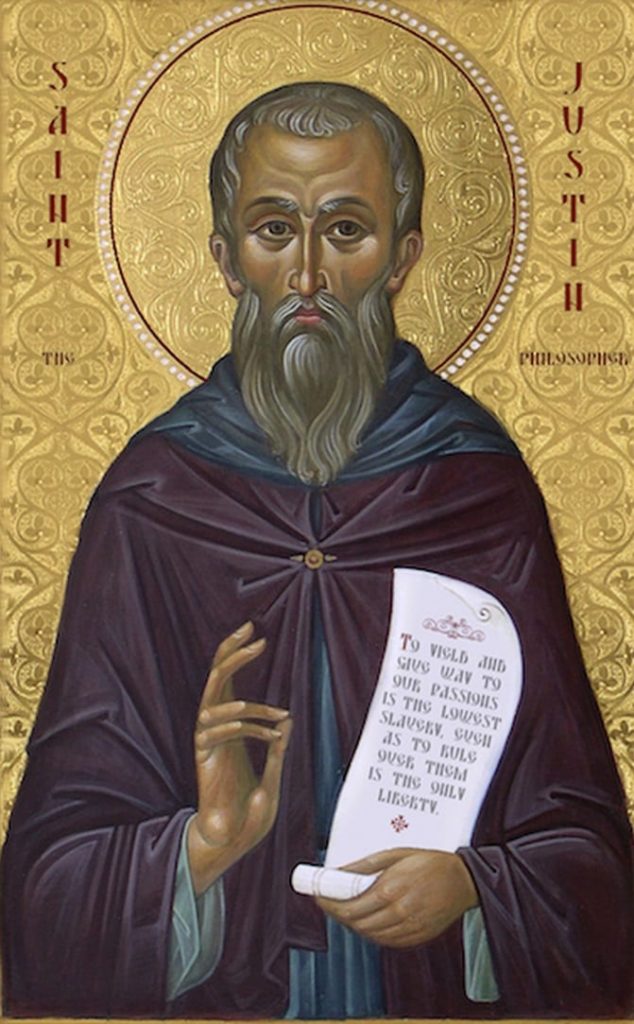
In this way, although Justin disputed Greek philosophy and its contradictions, he decisively oriented any philosophical truth to the Logos, giving reasons for the unusual “claim” to truth and universality of the Christian religion. If the Old Testament leaned towards Christ, just as the symbol is a guide to the reality represented, then Greek philosophy also aspired to Christ and the Gospel, just as the part strives to be united with the whole.
And he said that these two realities, the Old Testament and Greek philosophy, are like two paths that lead to Christ, to the Logos. This is why Greek philosophy cannot be opposed to Gospel truth, and Christians can draw from it confidently as from a good of their own.
Therefore, my venerable Predecessor, Pope John Paul II, described St Justin as a “pioneer of positive engagement with philosophical thinking – albeit with cautious discernment…. Although he continued to hold Greek philosophy in high esteem after his conversion, Justin claimed with power and clarity that he had found in Christianity ‘the only sure and profitable philosophy’ (Dial. 8: 1)” (Fides et Ratio, n. 38).
Overall, the figure and work of Justin mark the ancient Church’s forceful option for philosophy, for reason, rather than for the religion of the pagans. With the pagan religion, in fact, the early Christians strenuously rejected every compromise. They held it to be idolatry, at the cost of being accused for this reason of “impiety” and “atheism”.
Justin in particular, especially in his first Apology, mercilessly criticized the pagan religion and its myths, which he considered to be diabolically misleading on the path of truth.
Philosophy, on the other hand, represented the privileged area of the encounter between paganism, Judaism and Christianity, precisely at the level of the criticism of pagan religion and its false myths. “Our philosophy…”: this is how another apologist, Bishop Melito of Sardis, a contemporary of Justin, came to define the new religion in a more explicit way (Ap. Hist. Eccl. 4, 26, 7).
In fact, the pagan religion did not follow the ways of the Logos, but clung to myth, even if Greek philosophy recognized that mythology was devoid of consistency with the truth.
Therefore, the decline of the pagan religion was inevitable: it was a logical consequence of the detachment of religion – reduced to an artificial collection of ceremonies, conventions and customs – from the truth of being.
Justin, and with him other apologists, adopted the clear stance taken by the Christian faith for the God of the philosophers against the false gods of the pagan religion.
It was the choice of the truth of being against the myth of custom. Several decades after Justin, Tertullian defined the same option of Christians with a lapidary sentence that still applies: “Dominus noster Christus veritatem se, non consuetudinem, cognominavit – Christ has said that he is truth not fashion” (De Virgin. Vel. 1, 1).
It should be noted in this regard that the term consuetudo, used here by Tertullian in reference to the pagan religion, can be translated into modern languages with the expressions: “cultural fashion”, “current fads”.
In a time like ours, marked by relativism in the discussion on values and on religion – as well as in interreligious dialogue – this is a lesson that should not be forgotten.
To this end, I suggest to you once again – and thus I conclude – the last words of the mysterious old man whom Justin the Philosopher met on the seashore: “Pray that, above all things, the gates of light may be opened to you; for these things cannot be perceived or understood by all, but only by the man to whom God and his Christ have imparted wisdom” (Dial. 7: 3).
Source: http://www.vatican.va/content/benedict-xvi/en/audiences/2007/documents/hf_ben-xvi_aud_20070321.html
EMPHASIS MINE.
Stay updated: subscribe by email for free TO OUR NEW WEBSITE www.catholicsstrivingforholiness.org (PUT YOUR EMAIL IN THE SUBSCRIBE WIDGET).
We are also in www.fb.com/Catholicsstrivingforholiness. Kindly help more people in their Christian life by liking our page and inviting your family, friends and relatives to do so as well. Thanks in advance and God bless you and your loved ones! Fr. Rolly Arjonillo

